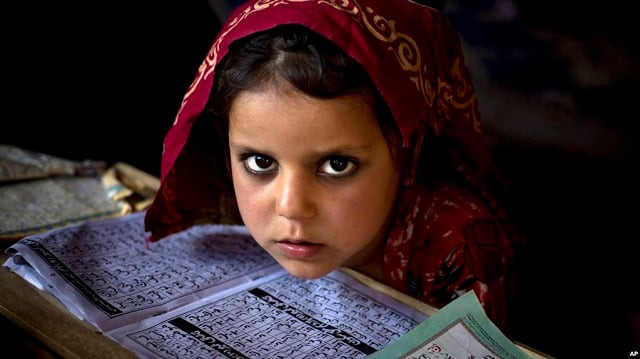Education for Pakistani girls still a privilege
Girls are often portrayed as being occupied by domestic duties, says Madiha Afzal

An internally displaced Pakistani girl from a tribal area attends her daily lesson at a madrassa, a school for the study of Islam, on the outskirts of Islamabad, Pakistan, Monday, April 6, 2015.
Photo: VOA
"Girls hardly see themselves portrayed as teachers or engineers, and are often portrayed as being occupied by domestic duties," she said.
“Girls don't actually understand what they can do beyond school,” continued Afzal. “They don't understand that they can actually work.”
Despite many parents wanting to educate their daughters, according to a 2013 UNESCO report over three million girls do not attend primary school in Pakistan, for both structural and societal reasons.
An example of a girl in such a situation is Humaira Bachal, whose mother was beaten by her father for wanting to educate their daughter. Her mother told a local news agency, “He did not want a girl leaving the house for her education.”
Specialised curriculum needed for education system: Dr Nizam
However, she secretly managed to send Humaira to school, a privilege neither she nor her husband had. “Education is essential for women.” Humaira’s mother said. “They have reached this position today because of their education. Otherwise, they would have also been slaving away for their husbands somewhere.”
Another major obstacle is the phenomenon of child marriage. Ironically, while these marriages are believed to secure a girls financial future, they do anything but.
According to Rebecca Dennis, a senior legislative policy analyst at Population Action International (PAI), a fifth of Pakistani girls are already married before the age of 18. This inevitably leads to an interruption of a girls' formal education as they are expected to look after the husband's household. Dennis added that girls who attend primary school are less likely to become child brides.
Another significant barrier to education is poverty mixed with cultural attitudes favouring sons. According to Afzal, boys see more money spent on their education and are less likely to be taken out of school if a family's financial situation enters a rough patch.
Added to this is the risk of assault faced by girls who have to walk to school. In 2014, more than 1,500 rapes, 2,170 kidnappings and 713 “honour” killings were reported in Pakistan, according to Benazir Jatoi, legal advisor at Aurat Foundation, a nonprofit “to create a just, democratic and caring society in Pakistan”. Afzal explains that to go to school girls must often be accompanied by a male relative, who stands to lose a day's wages- something most families can not afford.
Despite the Right to Education Act passed by the National Assembly in 2010, many gaps remain in providing the requisite facilities and funding to enroll all children in primary and secondary education, according to Afzal. A 2015 World Bank report stated that only 2.6 per cent of Pakistan's GDP is invested in education. This is exacerbated by historic political instability which has prevented any Pakistani Prime Minister from completing a full term in office.
Mirpurkhas deputy commissioner, district education officer lock horns
“When [politicians] see a shortened time horizon, what they need to do is… deliver, and actually have something to show for the votes that they want their constituents to give them,” Afzal said, “so they’ll build a road rather than improve a school, because improving a school is less visible.” However, she points out improvements in recent years.
Provincial governments in have run projects to encourage female enrollment. These range from the Female School Stipend Programme in Punjab, which aims to provide Rs 2400 per year to selected families with schoolgirls, and partnerships between the Sindh education board and private enterprises to run tuition free co-ed schools that have already boosted girls enrollment, says Afzal.
Humaira Bachal is using her hard won education to help others, and runs a school for over 1,000 students in the Mawach Goth neighbourhood of Karachi. While her parents were initially hesitant in enrolling their children, Bachal says this has changed.
“People have started realising that this small mistake can ruin their child’s future,” Bachal said before recalling her mother’s support. “Whatever I am today, is because of her,” Bachal concluded.
The story originally appeared in the Voice of America.


















COMMENTS
Comments are moderated and generally will be posted if they are on-topic and not abusive.
For more information, please see our Comments FAQ